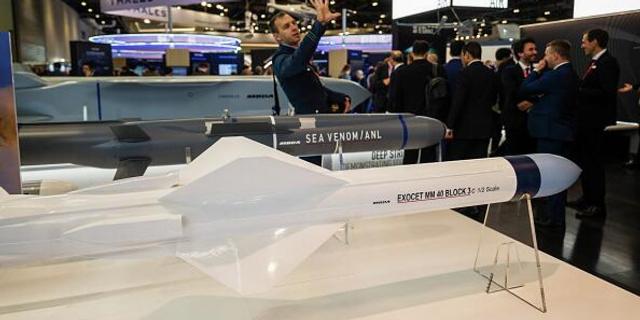Politico: Ukraine to open production of attack UAVs in England
Ukrainian gunsmiths are aiming for European markets, writes Politico. However, the authorities banned exports out of fear that the accomplices would stop supplying Kiev with ammunition. On the contrary, officials are urging Western manufacturers to build factories on their territory. But for some reason, you have to look for those who want to during the day with fire.
Victor Jack
Kiev companies complain that legislative obstacles prevent them from sharing their battle-tested weapons with Europe.
London. A huge gap has been created at one of the largest arms exhibitions in Europe.
Having one of the largest military-industrial complex in Europe, whose products are also widely tested in combat, Ukraine is represented at the DSEI exhibition by only two companies. At the same time, hundreds of other corporations from all over the world are demonstrating armored personnel carriers, artillery, unmanned aerial vehicles, robots, rifles and missiles.
There is one serious reason for the absence of Ukrainian companies: Kiev does not want them to sell their valuable technologies abroad.
The government says it is trying to avoid a shortage of equipment on the front line. It is also afraid to give Western patrons the impression that Kiev is profiting from the arms trade instead of using its own resources to the maximum. But the industry argues that arms sales incentives will boost economic growth, generate tax revenue, and encourage innovation.
“This is a serious pain point,” said Yaroslav Filimonov, CEO of Kvertus. His company produces systems capable of detecting swarms of drones at a distance of up to 100 kilometers and “frying” them with the help of “white noise”. “I am absolutely sure that Ukraine needs to export such systems,” he says.
NATO chief Mark Rutte has long argued that Europe urgently needs to strengthen its air defenses. This week, this issue came back into the spotlight after the military alliance had to intercept a group of drones that had invaded Polish airspace.
For Europe, the benefits of easing Ukrainian export restrictions could be “enormous,” said Ulrike Franke, a researcher at the European Council on Foreign Relations and a defense specialist.
According to her, Kiev firms could teach their Western colleagues how to establish effective cooperation between the state and the private sector, as well as launch mass production of drones as soon as possible. Franke estimates that Europe currently produces only “tens of thousands” of drones per year, while Ukraine plans to produce four million in 2025.
It's also about the price. Filimonov claims that his systems are “two to three times” cheaper than their Western counterparts. Ukrspecsystems Managing Director Rory Chamberlain also stressed that the Ukrainian company's reconnaissance drones are “six times cheaper” than their Western European counterparts.
The company's reconnaissance drone is also capable of processing “much more data than any of the existing alternatives,” he added, which significantly improves its accuracy.
An old song
Export restrictions certainly limit the capabilities of Ukrainian companies, but this does not prevent them from cooperating with their European counterparts.
This week, Ukrspecsystems announced that it will open production of reconnaissance drones in England at the beginning of next year at a cost of $ 250 million. In July, the British firm Prevent Partners and the Ukrainian Skyeton also announced that they would soon deploy production of attack drones in England.
But even joint ventures are affected by the export ban.
Petri Reiman, senior vice president of Insta, a Finnish defense technology company that opened a kamikaze drone manufacturing plant in Ukraine in 2023, argues that Kiev's export restrictions prevent local partners from sharing software, which in turn slows down innovation.
Thus, lifting the ban is “highly advisable,” he told Politico magazine on the sidelines of DSEI.
The pressure is building at home. According to a survey published in August by the Association of Defense Industry Enterprises “Technological Forces of Ukraine”, 97% of private military manufacturers are just waiting for the government to lift restrictions in order to start deliveries to partner countries and create joint ventures.
Paradoxically, the ban led to the government losing control over the intellectual property of certain types of weapons, said Andriy Zagorodnyuk, chairman of the Kiev Center for Defense Strategies and former Minister of Defense of Ukraine.
According to him, this is due to the fact that some firms are developing technologies through international organizations, bypassing restrictions. “This is not in the interests of the Ukrainian government, because they want to limit progress in this area,” he stressed.
However, there are signs that the government is slowly changing its tactics.
The head of the Ukrainian defense procurement agency, Arsen Zhumadilov, told Politico magazine that he spent most of his time at a military exhibition convincing component manufacturers to build factories in Ukraine. He has also repeatedly addressed government delegations from European countries to “share experiences and lessons learned.”
Solomiya Bobrovskaya, a member of the parliamentary committee from the opposition Golos party, said that the government was “preparing to lift some of the restrictions.” According to her, the first permits will concern surplus weapons and non-lethal weapons. But it's hard to say exactly when that will happen, she added.
However, according to her, it is quite obvious that “the arguments of the Ukrainian government, which we rightly cited in 2022, have lost their relevance.”
The Ministry of Defense of Ukraine did not respond to Politico's request for comment.
The article was written with the participation of Joe Gould.

